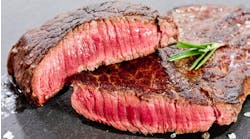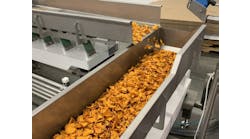ConAgra Foods' Lamb Weston sweet potato processing facility in Delhi, La., received its official Leadership in Energy and Environmental Design (LEED) platinum certification on Jan. 20 from the U. S. Green Building Council (USGBC).The Delhi facility claims to be the first frozen food manufacturing plant worldwide to earn LEED platinum certification, the highest distinction available to green buildings. The design, construction and operations at the Delhi processing facility were all developed with environmental impact and sustainability in mind.The plant primarily processes sweet potatoes from Louisiana and the surrounding states — prime sweet potato-growing regions — and eventually will convert fresh sweet potatoes into many different consumer and restaurant products prepared from frozen. It was built from the ground-up using the newest and best processing and packaging technologies. Operations began in September 2010.The state-of-the art equipment featured in the plant was uniquely designed to process sweet potatoes in the most efficient and environmentally responsible way — key for long-term, economic sustainability. Efficient operations mean more efficient use of natural resources within the community, including energy and water. Employees also benefit from the green building design; it is climate-controlled throughout to enhance productivity, safety and comfort."We had an opportunity to build something from scratch and set out to build a great sustainable plant because it was right for the business and who we are as a company," said Rick Martin, vice president for manufacturing at Lamb Weston. 'We've been producing quality sweet potato products for the past 10 years, which allowed us to bring the best of what we've learned during this time to the design and construction of the Delhi plant."To earn LEED platinum certification, a building is evaluated by the USGBC on a number of criteria: sustainable sites (protecting the environment), water efficiency, energy and atmosphere, materials and resources, indoor environmental quality, and the innovation and design process. Notable features of the Lamb Weston plant include:
- The entire plant is climate controlled to increase worker productivity, safety and comfort. Climate control in such a hot, humid environment reduces condensation build up and water on the floors, reducing slip and fall and hazards. Materials, such as low volatile organic compounds carpeting, cleaning products and paints, are used in the interior of the plant to reduce occupant exposure to airborne pollutants.
- Energy-saving equipment is projected to save 40% of the annual energy consumed at a comparable plant. By identifying and recovering potential wasted energy within the building systems and processes, energy demand is greatly reduced.
- Biogas, produced by treating process waste water, is piped back to the plant boilers to produce steam. This process is expected to offset approximately 20% of the annual natural gas demand of the plant, and prevents methane, a harmful greenhouse gas, from entering the atmosphere.
- More than 100 acres of the property will be maintained as open space, including protected wetlands, ponds and restored native vegetation. Water is conserved outside the building by landscaping with native plant species that require no irrigation once established.
- Priority parking is given to low-emission, fuel efficient vehicles.

